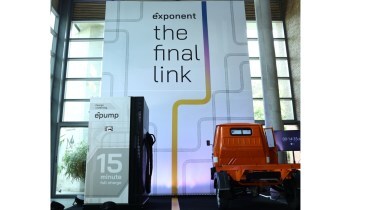Bengaluru-based technology start-up Exponent Energy showcased the secret behind its patented 15-minute rapid charging battery technology to the media in an event recently. After it had announced its partnership with Altigreen Propulsion Labs to launch electric three-wheelers for its proprietary technology, Exponent has completed over 25,000 rapid charging sessions, and covered over 10,00,000km with over 200 electric three-wheelers powered by its rapid charging tech in the last three months.
Arun Vinayak, Co-Founder & CEO, Exponent Energy pointed out, “In a beta test we realised that at 40 charging stations is just good enough to start with, but 100 is what we are targeting. If you look at Bengaluru today we have only 300 petrol stations all brands put together. Going forward we are targeting about 1,000-plus charging stations in the top 6 cities.” At present, the cost of a charging station is under Rs 5 lakh, and given the scale it could reduce further.
Business case
Exponent Energy is now looking at newer segments, including “buses” to use this fast-charging technology and it is likely to make announcements in the coming months. “We don’t intend to be exclusive in any segment with anyone. But it’s more so that we would like to take big bets with select OEMs,” added Vinayak.
In an interesting anecdote, the co-founder of the start-up revealed that if the average use of a charging station is less than 10 vehicles a day, it tends not to be profitable, for Exponent Energy’s case its top 5 charging stations have an average usage of more than 21 vehicles a day. The highest being 41 vehicles charged in a day on a single station. On the other hand, Vinayak claimed a regular Tesla supercharger which costs hundreds and thousands of dollars sees an average of 5 to 10 vehicles being charged. “We need to make the business case for the chargers as well, we don’t want vehicles to hog the chargers for hours. That’s why we dropped the double gun that could charge other vehicles,” he explained.
While Exponent Energy initially set up the charging infrastructure, it is now working on a franchise model, wherein the e^pump is owned by a partner on a revenue-sharing model, thus de-risking itself from a CAPEX-heavy model. Going forward, the company will keep expanding its network using the franchise model wherever needed.
New partnerships
Vinayak highlighted that Exponent Energy is working with contract manufacturers for manufacturing. The idea is to focus on being a technology company, “In the next 18 months we will focus on stabilising our businesses and expertise. We will focus on three-wheeler cargo and passenger vehicles and buses. I think I think in the next 12 months once we have achieved our targets there, we see ourselves having the bandwidth to maybe start thinking two-wheelers, lorries, and tractors.”
When asked about the average time-to-market for its partners, he said its tech offers a plug-and-play option. Through a customised modular approach, it is able to work with any cell. “If you’re an OEM using a particular cell and building a battery in a particular way. We can actually give you something using the same cell, maybe even a smaller battery. We don’t actually force them to like swap or use the same battery, we customise the battery for OEMs. We can come out with the battery pack anywhere between 2-5 months of a business relationship. For example, if an OEM comes to us in January, by March-April you will be having homologated vehicles ready to sell,” he said reiterating the company’s growing expertise.
Future plans
Vinayak is tight-lipped about new OEMs Exponent Energy is working with and global plans, it is safe to say with its tech play it has a huge global opportunity, especially in the commercial vehicle space, where its modular approach charges a vehicle in under 15-minute thus by providing a higher uptime.
He added, “Today we have a sharp focus on scaling up the technology. We have gone from zero to one to 10. But now we’re doing a 10 to 100. I think we got to start looking at these things when you’re doing 100 to 1,000. That’s how I see our business model scaling and the next 18 months, we are partnering up with more partners in the manufacturing space.”
Responding to his views on getting professionals to run the company, Vinayak concluded, “I think this is a very early startup. I think founder-led disruption is the way to go. And this is not the slow tech energy business, this is still a tech problem probably for the next 5 to 6 years.
